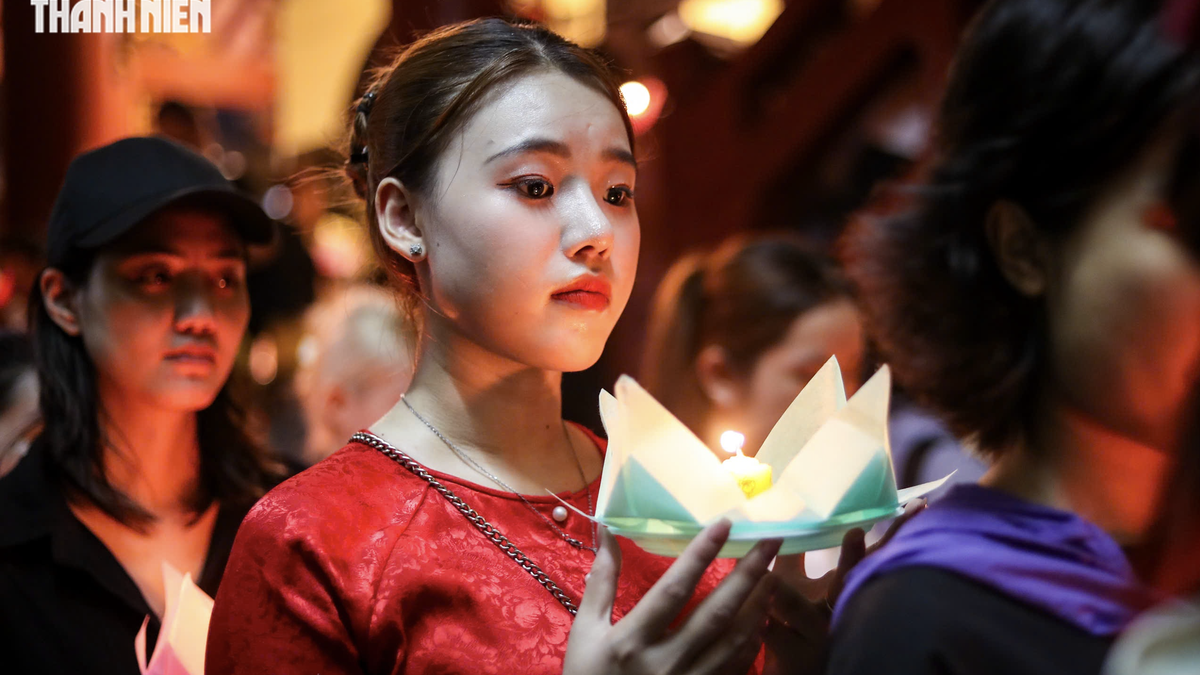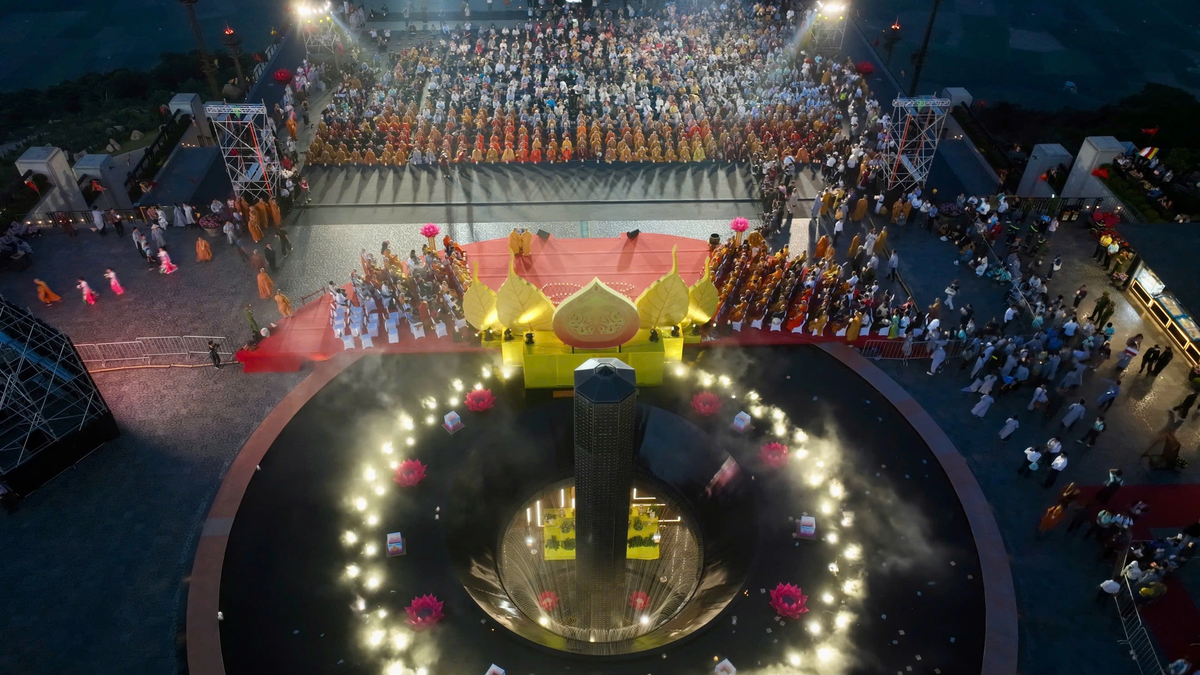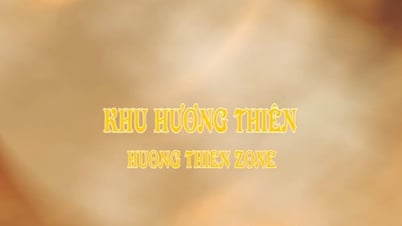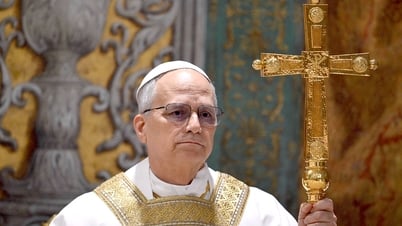Hoai Linh's efforts in playing the role of a priest in "Getting Rich with Ghosts" are visible. However, what he lacks is a more solid and convincing script to shine.
Get rich with ghosts released in theaters from August 29. The work, directed by Nguyen Nhat Trung, attracted attention when it gathered famous faces such as "billionaire male lead" Tuan Tran, Diep Bao Ngoc and, of course, Meritorious Artist Hoai Linh - the one-time king of the Vietnamese box office.
After a period of hiding due to private scandals, this is the rare time Hoai Linh accepts to act in a movie, after his guest role in Love Western girls (2022) was not very successful. He confided that this comeback felt like "eating porridge for a long time and then coming back to eat rice, it will be delicious".
Sharing about the filming process, Hoai Linh said he encountered many difficulties, and even felt frustrated at times because the director asked him to re-shoot many times. However, the actor is confident that he has experience in playing the role. "Because since I was 14-15 years old, I have helped people with burials," Hoai Linh said.
Hoai Linh's efforts are undeniable.
Get rich with ghosts The film revolves around the family genre, interwoven with comedy/horror elements. The story revolves around the lives of a father and son, Mr. Dao and Lanh (Tuan Tran). Lanh gradually falls into gambling, making his father upset. One day, by chance, he sees the spirit of a female ghost (Diep Bao Ngoc). The two make a deal: she helps him win the bet, he helps her find her child.
But according to the law of the dead, the more money Lanh earns, the more trouble Mr. Dao suffers. This is the important knot in the work, placing the main character between moral boundaries.

The character of Mr. Dao can be said to be Hoai Linh's most "different" role on the big screen. Before that, he often took on comedic roles, bringing laughter to the silver screen. The success of most of his works, from the Hello Miss Ba , The house with 5 fairies good My dad is a master ... mainly in the entertainment industry, which was popular about a decade ago, but is no longer popular today.
So, with a tragic role like the priest in Get rich with ghosts, Hoai Linh had to make an effort to overcome his years of being a comedian and to reinvent himself in the eyes of the audience. “Before, people used to watch me perform comedy more. This is a rare time I play a tragic role, so I have to change,” he confided to Knowledge - Znews.
In fact, Hoai Linh's performance is quite good. For most of the film, the character he plays is often immersed in sadness, especially since discovering that his son is addicted to cockfighting and is being forced to pay off debt by gangsters. The character's hardship is shown right from the character's appearance. Mr. Dao is old, his hair and beard are streaked with silver, his skin is tanned by the sun and wind, with deep crow's feet at the corners of his eyes, giving off a tired look.
Hoai Linh also shows a certain seriousness in his film acting. He has restraint in his emphasis and delivery of lines that are no longer dramatic, and his expression of the character's inner thoughts is also somewhat sharper. There are no more over-the-top or exaggerated scenes, the character's sadness or anger is expressed more subtly when using images as the main language of expression.
For example, when Mr. Dao heard that Lanh had to jump off a bridge to escape, he rushed to find his son. Seeing Lanh using a syringe, thinking that his son was addicted, he was stunned, just standing there looking at his son without saying a word. Without any dialogue, the audience could still feel the shock, disappointment and helplessness in the character's eyes filled with thoughts at that time.

The character has many limitations.
Family affection is still the main theme in Get rich with ghosts. Nguyen Nhat Trung's film sets up many conflicts and difficulties between Mr. Dao and his son, and then suddenly resolves all misunderstandings with a "coincidental" situation/discovery, in order to create intense emotional satisfaction for the audience.
This storytelling style is actually not new. The conflicting nature of the relationship between Mr. Dao and Lanh is not deep enough to be told throughout the 118-minute duration of the film.
The character's suffering is portrayed by the scriptwriter in the style of "being constantly haunted by poverty". The father and son live in a dilapidated house with messy, old furniture. Lanh has no specific job, while Mr. Dao carries coffins, a job that does not bring him a comfortable life. When Mr. Dao goes to work far away, Lanh takes him there, if he lives near his house, he can walk. The hardship of the profession of a coffin-bearer appears briefly in the scene of a group of people carrying a heavy coffin, or Mr. Dao accidentally steps on a nail while working...
When Lanh was forced to pay off his debt, Mr. Dao could not avoid being implicated. The father and son were beaten up many times, or Mr. Dao suffered the consequences many times when his son earned money according to the law of the underworld, but after just a quick bandage, or in a scene change, he returned to normal... Such "holes" unintentionally significantly reduced the sympathy of the audience for the character.

The climax of the film is pushed up after each time Mr. Dao discovers Lanh's new secret. At first, he doesn't even know and confidently "introduces" his good son to his drinking buddies. Then, the character gradually discovers that his son is addicted to gambling, time and time again, causing the debt to pile up, compounding interest. Until he witnesses Lanh injecting himself on the riverbank, Mr. Dao thinks he is "addicted". After that time, the tension between father and son is pushed to the peak.
Hoai Linh tried very hard, but what he did not really show well was the change in the character's psychology through each turning point of the story. The lack of emotional connections that were built progressively, exploding at the climax of the second act of the film was not effective. Hoai Linh's acting was not really valuable, clearly shown in the close-up shot when the father and son sat opposite each other, silently looking at each other in the house.
If before he successfully recreated the disappointment and helplessness, then in this scene, the audience did not clearly see the strong psychological changes of the character, when pushed to the boundary of faith and patience with his child. Mr. Dao's eyes at that time had anger, inhibition, but lacked a bit of surprise, despair and had an excess of resentment and hatred.
Because of that, the chemistry between Hoai Linh and Tuan Tran's roles did not explode as expected. At the end of the film, the screenwriter strongly "delivered the final blow" with an ostentatious tragedy. With no one to help, nor any means, Mr. Dao carried his child in the rain to the hospital, tears streaming down his face, regretting the misunderstandings.
However, the director's staging was not skillful enough, unintentionally creating a sense of arrangement, unable to make the audience sympathize with the character.
Source







![[Photo] Prime Minister Pham Minh Chinh chairs Government Standing Committee meeting on Gia Binh airport project](https://vphoto.vietnam.vn/thumb/1200x675/vietnam/resource/IMAGE/2025/5/10/6d3bef55258d417b9bca53fbefd4aeee)





















![[Photo] General Secretary To Lam holds a brief meeting with Russian President Vladimir Putin](https://vphoto.vietnam.vn/thumb/1200x675/vietnam/resource/IMAGE/2025/5/10/bfaa3ffbc920467893367c80b68984c6)

































































Comment (0)